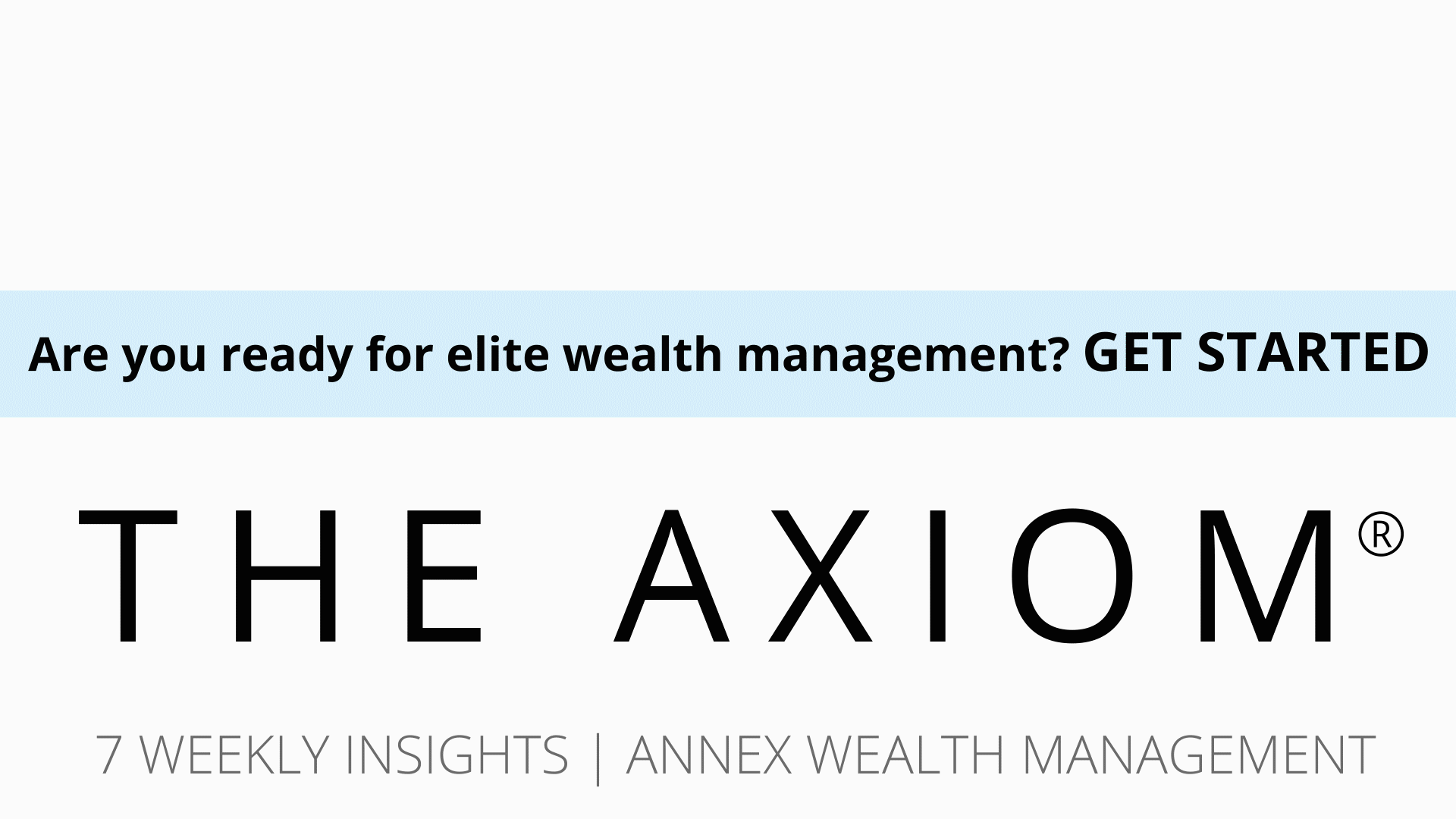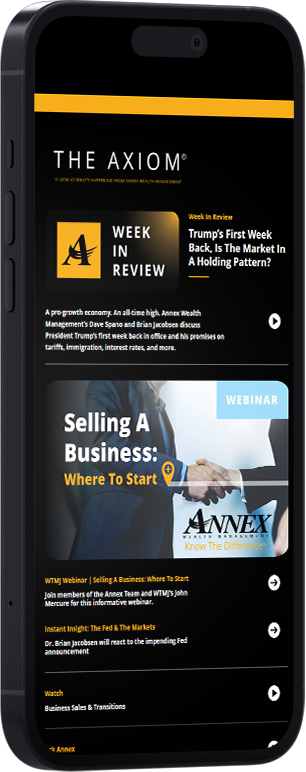
Axiom | Vol 284
Oops! We could not locate your form.
Featured: Annex Wealth Management’s President & CEO Dave Spano, CFP® Again Named To Milwaukee-Area Power Brokers

Annex Wealth Management’s President and CEO Dave Spano has again been named to the Milwaukee Business Journal’s “Milwaukee Power Brokers.” This is the second consecutive year Spano has been named to the list.
“Power Brokers” often impact their community and serve as leaders on both the public and private level. Dave has served as Chairman of the Board of the Financial Planning Association of Southern Wisconsin, the President of the Italian Community Center, Festa Italiana, and The United Ethnic Festivals. Dave also served on the boards of Summerfest, The Historic Third Ward, Lakeshore State Park and Miller Park Stadium Board, as well as the finance committees of Divine Savior Holy Angels High School and St. Mary’s Visitation.
A fixture on Milwaukee radio for years, Dave hosts several radio shows which air around the state and in Florida. On-air, he weaves insights as a CERTIFIED FINANCIAL PLANNER™ with more than 30 years of experience in wealth management.
Currently, Dave is the chairman of the Annex Charitable Foundation, which has donated hundreds of thousands of dollars to deserving charities in the community.
Annex Wealth Management is a frequent sponsor of community events and Spano is a generous contributor to many southeastern Wisconsin nonprofit groups.
BACK TO TOP ↑

Meet The Axiom®’s Guest Editor: Joseph Herron, CFP®, CRC®, CRPS™
I’m Joe Herron – 401k Relationship Manager here at Annex Wealth Management.
Our team creates, serves and supports various retirement plans sponsored by employers – typically 401k plans. My role, specifically, is to ensure that those employer-sponsored plans are running optimally, and to assist communicating 401k plan benefits to employees. My interactions with employees often end up touching upon other facets of financial health, and in turn, elements of financial planning.
My wife and I recently celebrated our 25th wedding anniversary this past August and have been blessed with three wonderful children that keep us on our toes. I have a passion for fly-fishing, wood-working, the season of fall (even knowing what comes after), being active in my local church, listening to my children play their instruments, and constantly honing our professional craft of financial wellness.
BACK TO TOP ↑

Sometimes a high statistic, like the latest inflation figures, is less impactful when the experts know it’s going to be part of the future. Annex Wealth Management’s Dave Spano and Derek Felske discuss the market as a discounting mechanism.
BACK TO TOP ↑

A recent study shows that due to the pandemic our attitudes about saving and being wealthy have changed. Over the course of the next several weeks, we’re going to ask our readers some questions about what that means.
Poll | Week 5: In your opinion, what would it take for you to be financially comfortable?
Oops! We could not locate your form.
BACK TO TOP ↑

Who Can & Will Act As Your Power Of Attorney?
As we age, it becomes increasingly important to have financial powers of attorney in place to ensure someone can manage our finances once we’re unable to do so. Who you select in that role is a critical decision, as he or she will have a variety of duties and responsibilities when acting on your behalf.
This week’s MoneyDo: consider who can and will act as your power of attorney.
Your selection process will require some in-depth thought. Your choice must be someone you trust with your finances – and someone you can rely on to act in your best interest.
- It’s Not Always Family
It may seem easy to default to a family member as your choice for power of attorney. Remember – that a family member will be involved in your finances. Make sure it’s someone you trust. - There Is Work To Be Done
It’s important to talk through your decision with your potential Power of Attorney. He or she should acknowledge their personal willingness to serve your wishes amidst stress. Let them be honest with you about their commitment, and their ability to navigate what could be overwhelming circumstances. - Close To Home Isn’t As Critical As It Used To Be
While proximity to you may be important, it’s not as critical as it used to be due to online banking and being able to have virtual meetings with advisors. What is important is that the person has the time necessary to undertake the responsibilities. The more you can do to consolidate and simplify your financial situation, the easier it will be when they need to step in and take over. - Assertiveness Needed
Power of Attorneys tend to be needed at emotionally-charged times, when many conflicting voices may add stress to the moment. Consider who you’re selecting: can they handle the pressure and avoid undue influence from external sources?
Your choice should be able to resist family and friends’ insistence and hold to your wishes.
- Time For A Communicator
Consider how your candidate communicates. Could he or she plainly and calmly speak both to your family and other interested parties? An effective communicator in a time of trial will help you and your family navigate an emotional time.
What’s Involved?
A power of attorney has many responsibilities, including:
- Act in accordance with principal’s reasonable expectations
- Act in good faith
- Act within the scope of authority granted
- Act with loyalty for principal’s benefit
- Act impartially in the principal’s best interest and avoid conflicts of interest
- Act with care, competence and diligence
- Keep records of all receipts, disbursements and transactions
- Attempt to preserve the estate plan of the principal
- Cooperate and coordinate with the named health care power of attorney, if activated.
To be able to do all these things not only takes time, but it requires that individual to have a full understanding of your financial life. You can help them succeed in the role by:
- Providing them with a copy of the Power of Attorney document now, so they can understand the powers you’ve granted under the document.
- Gathering and summarizing all your financial information into an easy to understand and follow document, such as a balance sheet or financial organizer.
BACK TO TOP ↑

“One of my favorite aspects of the Axiom is “Ask Annex”. In this section, Annex Wealth Management can obtain a pulse on what topics and questions clients have on their minds, and in turn, directly answer these concerns. Sometimes they’re more practical lifestyle questions with several potential answers, since financial planning is not a one-size-fits-all type profession. Sometimes, they’re technical questions with complex answers. Check it out! Go ahead, submit your question.“
– Guest Editor: Joseph Herron, CFP®, CRC®, CRPS™ | 401(k) Relationship Manager
________________________________________
This week’s Ask Annex comes from Ross, who asks:
“What is proactive management and who usually benefits from it?“
_________________
We asked Annex Wealth Management’s Randy Winkler, CFP®:
I like to think that defining Proactive Management starts by dissecting the word ‘Proactive’. You need a ‘Pro’ to do it, and it’s very ‘Active.’ It’s managing investments by taking an active, not passive (set it and forget it …) approach and reacting to changing conditions (inflation, fed moves, earnings, etc.). The pro’s managing the portfolio will be making buys and sells based on their ‘read’ of the market. Where are opportunities? Where are threats?
Who can benefit from proactive management? Everyone! Having a pro watching your portfolio and anticipating, instead of reacting, to all the news and noise out there is very important. Our Investment Team at Annex is researching, evaluating, and discussing various investments all day every day!
– Randy Winkler, CFP® | Wealth Manager
BACK TO TOP ↑

“The 4% Rule” has recently come under fire from retirement experts who claim that this rate of withdrawal is no longer realistic. Annex Wealth Management’s Financial Planning Manager, Randy Winkler, CFP® explains what the rule means and how the concept can still be helpful if realistically applied to a modern-day portfolio.
BACK TO TOP ↑


KNOW THE DIFFERENCE MINUTE:
KNOW THE DIFFERENCE MINUTE:
ANNEX RADIO
BACK TO TOP ↑

Annex Wealth Management provides free workshops, open to the public, on key wealth management topics.
Check back soon for new events!Missed one of our events? Watch it HERE.
BACK TO TOP ↑






